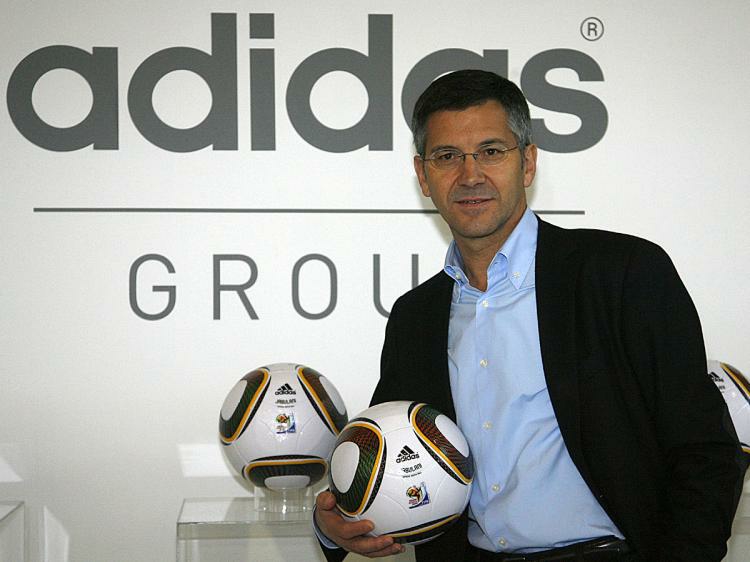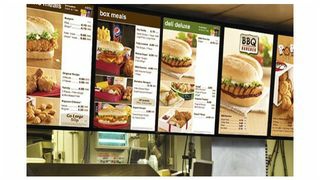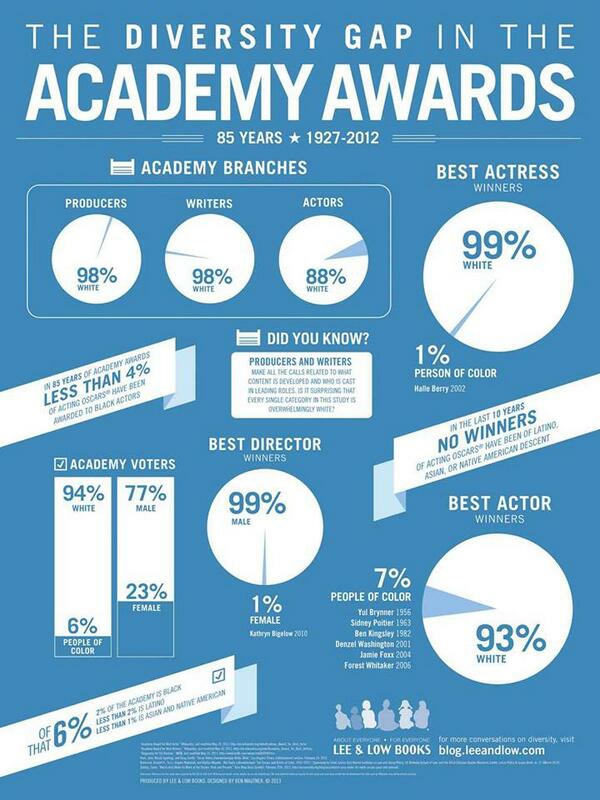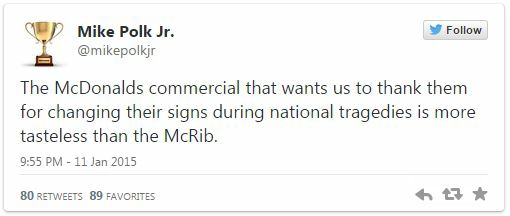McDonald's Latest Emotional Appeal
In yet another attempt to win customers and stave off declining revenue, McDonald's created a clever ad for Game Day. The company's Super Bowl ad is called Pay with Lovin'. If you're one of the lucky few to be selected through February 14, you'll get a free item by, for example, calling your mother to tell her you love her, dancing, or hugging someone.
A McDonald's spokesperson said, "We want to thank our customers for making our day and hopefully they will make someone else's as well-that's what Lovin' is all about. From selfies, hugs to high fives-we have a bunch of fun ways to express your Lovin'."
Also this week, McDonald's CEO has "retired."
Discussion Starters:
- What do you think of the ad and the marketing strategy?
- What other ideas do you have for McDonald's? How else can the company lure customers to the restaurants with emotional appeal?
Head of School's Snow Day Video Message
Wow, 2 million views for this headmaster's "School Is Closed" video on YouTube. A parody of Disney's "Let It Go" from "Frozen," the song is catchy and has attracted lots of attention. Time magazine tweeted the video, which could explain its popularity.
A graduate of Moses Brown school, a 231-year-old Quaker school, Matt Glendinning has two young girls who affirmed the video. According to Glendinning, "They love it. That actually was my first big litmus test. After it was done, my 8-year-old said, 'That is awesome.' So I thought, 'OK, we're cool. We're going to be alright.'"
Discussion Starters:
- What risks did Glendinning take when making this video?
- Do you find it funny, endearing, goofy, all of the above, none of the above, or something else?
Target Employee Commits Suicide

A Target employee committed suicide apparently after being humiliated at a store. The mother of 22-year-old Graham Gentles filed suit, and her attorney describes his experience at the store:
"While he was cuffed he was paraded through the store into a room and was interrogated there," attorney Patrick McNicholas said. "He was then paraded back out to the store, put into a patrol car and taken to Pasadena police station."
Gentles was accused of stealing but wasn't charged with a crime.
Gentles' attorney says that he had autism: "He was hyper focused on his loss, and it was a perfect storm which resulted in his death." His mother says that her son told her, "Mom this is the worst day of my life." The suit also claims that the "walk of shame" is part of Target's disciplinary policy. Target issued this statement:
"Our thoughts and sympathies go out to the friends and family of this individual. The allegations in the lawsuit of a Target policy or practice are simply not true. There is no such policy. As this is pending litigation, we don't have further comment at this time."
Discussion Starters:
- What is Target's potential responsibility? Do you believe the company is to blame for Gentles' suicide?
- Assess Target's statement. How appropriate is it, given the situation?
Taco Bell Pays Conan O'Brien to Poke Fun
Why would a company hire Conan O'Brien to call a brick "the first experimental taco"? The late-night TV host is known for his "spontaneous," "awkward" humor, and his pitch for Taco Bell is no different.
In a nearly 10-minute video watched on YouTube by 1.4 million people, O'Brien brings the head of his IT department to Taco Bell headquarters for a full tour. They learn some history, watch people taste-testing food, and try new products. After eating a casa lupa, which O'Brien says sounds like a "case of lupus," he fakes a seizure.
The video is on Conan's site but at the end reads: "Paid Consideration Provided by Taco Bell Corp."
Discussion Starters:
- How effective is this Taco Bell promotion? What works well?
- Do you find it deceiving, or should people know that it's essentially a paid advertisement?
Adidas CEO Defends His Job
 Facing criticism about the future of Adidas, CEO Herbert Hainer won't step down. In an article in a German newspaper, Hainer admitted to losing sales to Nike and said "Suddenly, everything that was right for 12 years, was wrong."
Facing criticism about the future of Adidas, CEO Herbert Hainer won't step down. In an article in a German newspaper, Hainer admitted to losing sales to Nike and said "Suddenly, everything that was right for 12 years, was wrong."
Hainer has been CEO since 2001, and a succession plan is in progress, but some investors want to see a change sooner than 2017, when his contract ends. Pressure started back in September, when the company saw declining sales in soccer and Reebok products and after the stock had dropped 38% for the year.
Hainer admits mistakes in investing in the soccer market but says, "If I no longer had the ambition and the energy, and the firm belief that I can bring the company further forward, then I would stop immediately."
Discussion Starters:
- What's your view of Hainer's decision to speak with the German newspaper? What other options does he have for conveying his point of view?
- How do you think the Board feels about Hainer's position and his comments to the newspaper?
- Do you find Hainer's comments convincing?
Print Lives (at JCPenney)
 JCPenney is bringing back its hefty (120-page) print catalog. After reviewing data from online sales, the company recognized that, although people bought online, they were inspired by print photos.
JCPenney is bringing back its hefty (120-page) print catalog. After reviewing data from online sales, the company recognized that, although people bought online, they were inspired by print photos.
It's been six years of focusing on web marketing, but the Consumerist explains the turnaround:
"The catalog has been revived by the executive who killed it off in the first place, chairman and CEO Myron Ullman. The company assumed that catalog shoppers would switch to making their purchases online, as they have at other retailers. That wasn't the case: Ullman says that the company discovered that many online sales actually began when the customer was flipping through a catalog offline."
The Consumerist compares JCPenney's strategy to Restoration Hardware's. I'm not on the mailing list, but apparently the company distributes a 17-pound catalog.
Discussion Starters:
- What are the company's considerations in bringing back the catalog? Why do you think the management team discontinued it six years ago?
- How do you see print and online ordering working together? What's your own process for shopping on the web?
TurboTax Apologizes for Change
TurboTax changed its software and didn't communicate the decision as well as it could have. People rely on the program to do their own taxes rather than hiring an accountant. But the company omitted some forms, and users didn't realize until they starting working in the system.
General Manager Sasan Goodarzi is front and center-including this photo- in the apology that was distributed by email to TurboTax registered users.
Download full TurboTax apology.
Discussion Starters:
- What principles of business writing does Goodarzi use in his statement? Particularly consider the organization: how is the statement structured, and how does he organize each paragraph?
- How effective is his apology? What might users appreciate, and what could further anger them?
Facebook Time, Multitasking, and Students' Performance
 A study published in the Journal of Applied Developmental Psychology correlates time spent on Facebook and multitasking with poorer academic performance. An Iowa State researcher studied 1649 active student users, and found that seniors spent less time on Facebook and less time multitasking than freshmen, sophomores, and juniors.
A study published in the Journal of Applied Developmental Psychology correlates time spent on Facebook and multitasking with poorer academic performance. An Iowa State researcher studied 1649 active student users, and found that seniors spent less time on Facebook and less time multitasking than freshmen, sophomores, and juniors.
Time spent on the site was negatively predictive of freshmen's GPA, and multitasking was negatively predictive of GPA for all ranks but seniors.
Discussion Starters:
- What, if anything, about these findings surprise you?
- The respondents attended Iowa State University. Do you think the results would differ at other universities?
- What cautions would you raise about the findings?
Oscar Diversity Problem? "Not at All"
The Academy Awards are under fire for lacking diversity in nominations this year. Although "Selma," the film about Martin Luther King, was nominated for best picture, its director and lead actor were snubbed. Criticism looms partly because all 20 nominees for best actor and supporting actor are white. "Selma," a highly acclaimed film received only one other nomination: best song.
Cheryl Boone Isaacs, the Academy's first black president, said, "Not at all. Not at all," when asked whether the organization had a "problem with recognizing diversity." She also told Vulture
"Well, it's a terrific motion picture, and that we can never and should not take away from it, the fact that it is a terrific motion picture. There are a lot of terrific motion pictures, it's a very competitive time, and there's a lot of great work that has been done. I am very happy that Selma is included in our eight terrific motioncture [nominations]."
"The good news is that the wealth of talent is there, and it's being discussed, and it's helpful so much for talent-whether in front of the camera or behind the camera-to have this recognition, to have this period of time where there is a lot of publicity, a lot of chitter-chatter."
Isaacs also told Time, "I would love to see and look forward to see a greater cultural diversity among all our nominees in all of our categories."
An infographic and the Twitter hashtag #OscarsSoWhite give us more perspective on the controversy:
Discussion Starters:
- Do you agree with the criticism?
- Analyze Isaacs statements. What works well to convey the Academy's position, and what could be improved?
- Here's another graphic showing concern about the Academy's lack of diversity. Which do you find more effective in conveying the message?
DC MTA Apologizes for a Death
 Unlike the NY-area MTA when a train derailment killed four people, the Washington, DC, MTA is doing the right thing: apologizing for a death. Smoke filled a subway car, and officials later described communication with emergency personnel as "ineffective or sporadic."
Unlike the NY-area MTA when a train derailment killed four people, the Washington, DC, MTA is doing the right thing: apologizing for a death. Smoke filled a subway car, and officials later described communication with emergency personnel as "ineffective or sporadic."
One woman died, and about 80 riders were hospitalized. Some riders say they were trapped for more than 30 minutes before being rescued. Passengers tried to revive the 61-year-old Carol Inman Glover but were unsuccessful.
A report by the Fire and Medical Emergency Services department details the incident, including transcripts of 911 calls.
The MTA's apology is interesting in light of pending lawsuits, a common reason for organizations to avoid such displays of humanity.
Discussion Starters:
- Analyze the statement: the choice of a full-page ad in the Washington Post, the word choice, etc.
- What principles of report writing from Chapter 10 does the department use in the report? What could improve the report?
- Read the emails and 911 communications in the report. Any surprises?
McDonald's "Signs" Campaign
McDonald's is trying another tact for improving business. The latest marketing campaign, "Signs," shows the company standing by the community in times of tragedy.
McDonald's is certainly taking different approaches from simply promoting the taste of its food. The previous campaign focused on how food is made-an attempt at transparency, which worked for some but not everyone. The same could be said of this one.
Steve McKee, president of an ad agency in Albuquerque, complimented the approach: "I thought the ad was awesome. It's clear that all the billboards were real. It was demonstrating that McDonald's is Americana." Some say the ads distinguish McDonald's from Wendy's, Chipotle, and Burger King, which couldn't make such claims.
But others say the company is capitalizing on tragedy. And of course, any campaign is an opportunity for ridicule.
Discussion Starters:
- Describe the ad strategy. What objectives is McDonald's trying to achieve?
- What's your view of the campaign: tasteless, clever, or something else?
JetBlue Etiquette Videos
JetBlue created a series of videos on passenger etiquette, but not everyone thinks they're effective.
The videos may be entertaining and a good social media conversation starter, but what's the point? A Bloomberg article relays JetBlue's perspective:
"The JetBlue videos aren't intended to tell customers how to behave, Borromeo said in an interview. The exaggerated examples 'are meant to be fun' and to generate dialog with passengers about their experiences, she said.
"While the carrier would be 'thrilled' if the clips lead to positive behavior changes, 'we're also happy knowing that the video caused some travelers to smile and nod in understanding,' said Morgan Johnston, a spokesman for the carrier."
Critics say the videos should have a happy ending or at least offer suggestions for handling rude behavior on planes. Others say the clips only remind people how annoying it is to fly.
Discussion Starters:
- What do you see as the objectives for these videos? Do they achieve their purpose?
- How would you suggest passengers handle the situations in these two videos? Consider tactics discussed in Chapter 3 of the book.
Honda Responds to $70 Million Fine
 Honda has been fined a record $70 million for not reporting 1,729 injuries and deaths to The National Highway Traffic Safety Administration (NHTSA). The amount is twice what GM was fined when it failed to report 40 deaths because of ignition issues.
Honda has been fined a record $70 million for not reporting 1,729 injuries and deaths to The National Highway Traffic Safety Administration (NHTSA). The amount is twice what GM was fined when it failed to report 40 deaths because of ignition issues.
In a press statement, Honda blamed data entry and other errors for the reporting failure and promised to take "corrective measures":
Honda Resolves NHTSA Inquiry Regarding Early Warning Reporting
TORRANCE, Calif., Jan. 8, 2015 – American Honda Motor Co., Inc. ("Honda") has entered into an agreement with the National Highway Traffic Safety Administration (NHTSA) to resolve the government's inquiry into Honda's early warning reporting as required by the Transportation Recall Enhancement, Accountability and Documentation (TREAD) Act. As part of the Consent Order, Honda will pay a $70 million civil penalty and continue to implement a series of corrective measures among other requirements.
"We have resolved this matter and will move forward to build on the important actions Honda has already taken to address our past shortcomings in early warning reporting," said Rick Schostek, executive vice president, Honda North America, Inc. "We continue to fully cooperate with NHTSA to achieve greater transparency and to further enhance our reporting practices."
In order to ensure full compliance with its early warning reporting obligations, Honda has already begun taking steps to correct the errors responsible for the violations. The company is in the process of initiating new training regimens, changing internal reporting policy, making staffing and organizational changes, and enhancing oversight of its early warning reporting process.
The settlement agreement follows Honda's November 24, 2014 response to a Special Order issued by NHTSA in early November. That order was prompted by Honda's disclosure t NHTSA of preliminary findings from a third-party audit Honda commissioned in September 2014 in response to inadequately addressed discrepancies in the company's early warning reporting. In responding to the Special Order, as previously disclosed, Honda identified under-reporting of written claims or notices of injuries or deaths over the past decade due to errors related to data entry, computer coding, regulatory interpretation, and other errors in warranty and property damage claims reporting.
Discussion Starters:
- Assess Honda's statement. What works well to explain the company's position, and what could be improved?
- Do you buy Honda's explanation of the reporting failures?
FDA Issues Food-Labeling Regulations
 The Food and Drug Administration (FDA) has issued nutrition labeling regulations for restaurants and "similar retail food establishments." In an extremely long description, the FDA outlines requirements, including these provisions:
The Food and Drug Administration (FDA) has issued nutrition labeling regulations for restaurants and "similar retail food establishments." In an extremely long description, the FDA outlines requirements, including these provisions:
- Define terms, including terms that describe criteria for determining whether an establishment is subject to the rule;
- Require that calories for standard menu items be declared on menus and menu boards that list such foods for sale;
- Require that calories for standard menu items that are self-service or on display be declared on signs adjacent to such foods;
- Require that written nutrition information for standard menu items be available to consumers who ask to see it;
- Require, on menus and menu boards, a succinct statement concerning suggested daily caloric intake (succinct statement), designed to help the public understand the significance of the calorie declarations;
- Require, on menus and menu boards, a statement regarding the availability of the written nutrition information (statement of availability);
- Establish requirements for determination of nutrient content of standard menu items;
- Establish requirements for substantiation of nutrient content determined for standard menu items, including requirements for records that a covered establishment must make available to FDA within a reasonable period of time upon request; and
- Establish terms and conditions under which restaurants and similar retail food establishments not otherwise subject to the rule could elect to be subject to the requirements by registering with FDA.
The regulations have been drafted for years, and the new rules apply to restaurants with 20 or more locations serving similar food. One sticking point is about alcohol. Self-service drinks, such as bottled beer, as well as drinks on a standard menu all need to be labeled.
Discussion Starters:
- Read the FDA's regulations. How are they organized and written? What could be improved for restaurant owners and managers?
- What's your view of the new labeling regulations? What do you see as the goals, and will labels accomplish them?
Marriott's Response to Wi-Fi Criticism
 Marriott has been criticized for blocking guests' personal Wi-Fi connections, and the company petitioned to the Federal Communications Commission (FCC) for permission to use jammers. The request is still pending, but the FCC recently fined a Nashville Marriott for preventing guests' access to their own hotspots.
Marriott has been criticized for blocking guests' personal Wi-Fi connections, and the company petitioned to the Federal Communications Commission (FCC) for permission to use jammers. The request is still pending, but the FCC recently fined a Nashville Marriott for preventing guests' access to their own hotspots.
Critics say that Marriott wants to continue charging fees for Internet access while guests should be able to bring their own access. Conference guests, particularly, sometimes prefer their own hotspot to ensure a faster connection when multiple users are on simultaneously. But in a statement on its website, Marriott explains the company's position as a security issue rather than a way to control access:
12/30/2014
Marriott's Response to FCC Petition Filing
We understand there have been concerns regarding our position on the FCC petition filing, perhaps due to a lack of clarity about the issue. To set the record straight it has never been nor will it ever be Marriott's policy to limit our guests' ability to access the Internet by all available means, including through the use of personal Mi-Fi and/or Wi-Fi devices. As a matter of fact, we invite and encourage our guests to use these Internet connectivity devices in our hotels. To be clear, this matter does not involve in any way Wi-Fi access in hotel guestrooms or lobby spaces.
The question at hand is what measures a network operator can take to detect and contain rogue and imposter Wi-Fi hotspots used in our meeting and conference spaces that pose a security threat to meeting or conference attendees or cause interference to the conference guest wireless network.
In light of the increased use of wireless technology to launch cyber-attacks and purposefully disrupt hotel networks, Marriott along with the American Hotel & Lodging Association on behalf of the entire hotel industry is seeking clarity from the FCC regarding what lawful measures a network operator can take to prevent such attacks from occurring. We feel this is extremely important as we are increasingly being asked what measures we take to protect our conference and meeting guests and the conference groups that are using Wi-Fi technology in our hotels.
The FCC is accepting comments about the situation.
Discussion Starters:
- Marriott's statement has lots of qualifiers, such as, "To set the record straight," "As a matter of fact," and "To be clear." What do you make of these phrases?
- Should Marriott say more about the situation? The company denied comment for a Huffington Post article.
Study: Check Email Less Often
 A new study from the University of British Columbia's psychology department tells us to stop checking email so frequently. The study asked one group of subjects to turn off their email alerts and check email only three times a day for a week. Another group was told to check email as many times as they would like. Then, the groups switched for a second week.
A new study from the University of British Columbia's psychology department tells us to stop checking email so frequently. The study asked one group of subjects to turn off their email alerts and check email only three times a day for a week. Another group was told to check email as many times as they would like. Then, the groups switched for a second week.
Published in Computers in Human Behaviour, the study showed that checking email leads to feelings of stress and tension. Subjects answered the following questions:
- How often have you felt that you were unable to control the important things in your life?
- How often have you felt nervous and stressed?
- How often have you found that you could not cope with all the things that you had to do?
- How often have you been angered because of things that were outside of your control?
Discussion Starters:
- Do these results surprise you?
- How realistic is it to check email just two or three times a day at work?
- What could you do to limit the number of times you check email throughout the day?
Ogilvy Apologizes for Distasteful Ad
Ad agency Ogilvy & Mather has apologized for an offensive ad produced for Kurl-on, an Indian mattress company. What could go wrong when portraying a 14-year-old Taliban shooting victim in a cartoon?
The company wanted to show that heroic figures "bounce back," but the ad doesn't quite work. The New York Times describes Malala Yousafzai, featured in the promotion:
"At the age of 11, Malala Yousafzai took on the Taliban by giving voice to her dreams. As turbaned fighters swept through her town in northwestern Pakistan in 2009, the tiny schoolgirl spoke out about her passion for education - she wanted to become a doctor, she said - and became a symbol of defiance against Taliban subjugation."
Two other ads in the series aren't much better. Steve Jobs is shown pushed out a door, and Gandhi is thrown from a moving train.
Before this one hit paid media outlets, online news organizations flagged the image. Although Kurl-on hasn't responded to inquiries, Ogilvy issued this statement:
"We deeply regret this incident and want to apologize to Malala Yousafzai and her family. We are investigating how our standards were compromised in this case and will take whatever corrective action is necessary."
Discussion Starters:
- How do Kurl-on and Ogilvy share responsibility for the ad? How did this happen?
- The ad was created in Ogilvy's Indian office and produced in a Chilean studio. How, if at all, do these facts affect your thinking about the ad?
AirAsia CEO Apologizes for Lost Flight
In a news conference, CEO Tony Fernandes apologizes to the families of victims of the lost AirAsia flight. Fernandes responds to questions about the cause and compensation generally, but promises not to "run away from our obligations or hide behind any conventions. We will be there for the staff. . . [correction] for the families, even after all of this is over."
The Washington Post describes Fernandes as "a flamboyant Malaysian-born, British-educated former Warner Music executive, [who] had dreamed of operating his own budget airline since he was in school." He describes the lost flight as a "scar with me for the rest of my life."
The airline is suffering further embarrassment because of an in-flight magazine ad that bragged about the pilots' superior training: "well prepared to ensure [their] plane will never get lost." The article was published soon after the disappearance of Malaysia Airlines flight MH370.
Discussion Starters:
- Assess the news conference. How well did Fernandes handle the questions?
- At some point, he says that having families where they are trying to evacuate will "complicate" the process. What's your view of this statement?
Brands with Strange Foreign Names
 Chinese companies are capitalizing on the image of international sophistication by imitating American names, with mixed results. A New York Times article quotes a 20-year-old Chinese student: "Buy Chinese brands? Never. Foreign stuff is so much better."
Chinese companies are capitalizing on the image of international sophistication by imitating American names, with mixed results. A New York Times article quotes a 20-year-old Chinese student: "Buy Chinese brands? Never. Foreign stuff is so much better."
But the names are strange: Chrisden Deny, Prich, and Hotwind would make most Americans smile. According to a consultant in Shanghai, brand names, such as Adidios are Fuma are intentionally confusing.
Other names are just insulting. In a statement on its website, Colgate explains the history of Darlie toothpaste, a brand originally called Darkie and featuring an image of a minstrel in blackface:
"Almost 20 years ago, Colgate initiated action by Hawley & Hazel to eliminate the derogatory English name and packaging. The English brand name became "Darlie" and a stylized man in a top hat replaced the previous racial stereotype. These changes were implemented in 1990, with costs borne by Colgate. The Chinese language name, 'Hei ren,' was not changed. Hawley & Hazel's research shows that Chinese consumers perceive the 'Hei ren' toothpaste brand to be trustworthy, international and modern.
"Colgate is committed to demonstrating respect to all people; as a result of our investment in Hawley & Hazel, the totally unacceptable English language brand name was removed from the marketplace. We understand that there are different perspectives on the Chinese language brand, and we continue to consider these perspectives in our discussions with Hawley & Hazel."
I'm not sure how well Helen Keller glasses would sell in the United States.
Discussion Starters:
- Should Chinese and other country's brands make more of an effort to discover the cultural meaning of their names? Consider business, practical, and ethical implications.
- For the article, The New York Times asked Christian Dior for comment, but Dior didn't provide one. Should the company have made a statement and, if so, what would they say?
TripAdvisor Fined for Fake Reviews
 The Italian Competition Authority is fining TripAdvisor 500,000 euros (about $610,000) for failing to prevent fake reviews on its site. The regulator responded to complaints by consumers and hotel owners and accused TripAdvisor of misrepresenting the site as "authentic and genuine" by posting false "defamatory" reviews.
The Italian Competition Authority is fining TripAdvisor 500,000 euros (about $610,000) for failing to prevent fake reviews on its site. The regulator responded to complaints by consumers and hotel owners and accused TripAdvisor of misrepresenting the site as "authentic and genuine" by posting false "defamatory" reviews.
TripAdvisor disputed the ruling, saying that their fraud detectors and technology are "extremely effective in protecting consumers from the small minority of people who try to cheat our system," and "We firmly believe that TripAdvisor is a force for good - both for consumers and the hospitality industry."
The story reminds me of software developed at Cornell for spotting deceptive reviews. After it was trained, the software identified fake reviews 90% of the time compared to humans, who were successfully only 50% of the time.
Discussion Starters:
- What responsibility, if any, should TripAdvisor have for fake reviews on its site?
- Can you spot the fake review?


















